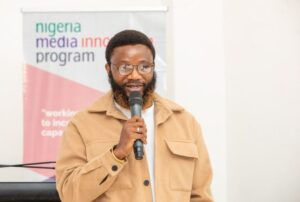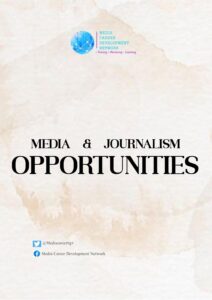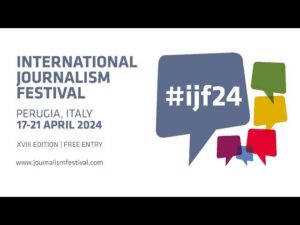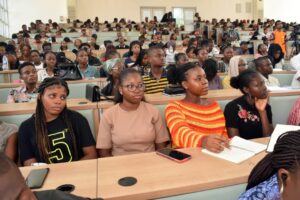Lagos-based media outfit, Media Career Development Network (MCDN) has concluded month-long activities to mark World Press Freedom Day 2022.
The programmes sponsored by the United States Consulate, Lagos were in Lagos and Port Harcourt.
The Lagos’s leg began with a film show about Joseph Pulitzer, an American journalist and rights activist. The movie screened at the American Corner at Ikeja, Lagos attracted about 100 journalists to the American Corner, Ikeja on 10th May.
Titled Joseph Pulitzer: Voice of The People, a three-member panel session reviewed highlights of the movie and stressed the need for journalists to be factual in their reporting, emphasising on the crucial role of the media in nation building and as gatekeepers in society.
Panellists including Deputy Director, Voice of Nigeria, Ugonma Cokey; Managing Editor, Travu, Pelu Awofeso; Head, Weekend Crime Desk, The Nation, Kunle Akinriade, while Ann Duke, TV Host, Plus TV Africa answered questions from viewers.
Awofeso noted that “Joseph Pulitzer was very passionate, had a creative understanding of what he needed to be and paid attention to the everyday people.”
In her comment, Ugonma speaking on ownership and influence and control in Nigeria’s media space said,
“Joseph Pulitzer although driven by passion also owns his own media outfit which also enabled him to go all out without any restraint, while another panellist, Kunle Akinrinade enjoined journalists to be crusaders like Joseph Pulitzer.”
The next activity of the celebration was training on fact-checking facilitated by David Ajikobi, Editor, Africa Check, and Hannah Ajakaiye, ICFJ Knight Fellow.
The facilitators shared their experiences, as well as tools to equip Journalists with new skills for investigations and how to verify information.
Earlier before the training, Stephen Ibeli of the American Consulate explained the involvement of the United States in the media career development of Nigerian journalists. Ibelli started by appreciating Nigerian journalists for their task of nation-building.
Talking about the involvement of the United States in developing the capacity of Nigerian journalists, he said, “We have been sending journalists to the United States since 1960, many Nigerian journalists have gone to the United States to report us and how we do things.”
The 79 participants at the workshop included journalists and allied professionals who learnt new skills and got exposed to new fact-checking tools.
The workshop however provided enlightenment for journalists on ways to fact-check and avoid misinformation and disinformation.
In his presentation, Ajikobi briefed participants about the need to verify the information before running to town with them.
“It is not difficult to identify the major influencers in conspiracy theories; they are usually quite vocal,” he said, continuing, “As a journalist, you have to be able to stand by your bias so you don’t fall victim to misinformation.”
Ajikobi also said that bias is a way by which information is filtered.
While facilitating a session, Hannah Ajakaiye warned journalists to beware of social media influencers.
“Working with social media influencers you have to be careful because some of them have been accused of misinformation,” she said.
Ajakaiye also enjoined journalists to invest in social media skills in order to counter misinformation.
“Fake news travels faster than real information and journalists need to invest in skills and disinformation travels faster because it is shorter and attractive,” Ajakaiye said, urging journalists to invest in self-development to detect errors.
Participants were elated after learning new things at the workshop.
Ajewole Joshua, Publisher, Golden Heritage News said, “It was a moment that I don’t think I can easily forget because now before I publish, post or comment on any article, I must ask the questions about its authenticity, source and the fact about it. It has also stepped up my level of professionalism in news reports and assessment.”
A participant, Precious Akintulubo, said the fact-checking workshop was a memorable experience.
“I really had an amazing experience at the fact-checking workshop. The session was in total alignment with the current era of a media crisis. Now I know how to avoid misinformation,” Akintulubo said.
The Port Harcourt leg of the project was held at the American Corner, the University of Port Harcourt on 19th May and was well attended by journalists despite that the Vice President, Professor Yemi Osinbajo was on a working visit to Port Harcourt the same day attracting several journalists who must be on duty.
Movie Screening of Joseph Pulitzer: Voice of The People was held and panellists including the Chairman of the Nigeran Union of Journalists, River State, Mr Stanley Job took turns to comment on the movie.
According to Job, journalism is an integral part of the Nigerian democracy and journalists must emulate the virtues and activism of Joseph Pulitzer to make a difference in any democracy. “Journalism is the oxygen of democracy,” he said.
Other panellists at the event were Rachel Izuogu Onah, Zonal Head of Programme, Federal Radio Corporation of Nigeria, Port Harcourt; Ann Godwin, Rivers State Correspondent, The Guardian Newspaper, Port Harcourt, and the Moderator, Carl Orakwue, Programme Manager, Nigeria Info, Port Harcourt.
Orakwue noted that the event is to remind the government of the need for press freedom and challenge journalists to hold the leaders accountable.
Job, while speaking on the importance of Press Freedom in a developing society mentioned that Journalism and Press freedom help democracy to thrive. Making reference to the movie, he said Joseph Pulitzer accused his president of lying to the people and he was not prosecuted, contrary to the present-day Nigerian leaders.
In her own comment, Ann Godwin referred to the major challenges facing press freedom in Nigeria as an over-flogged matter and attributed factors inhibiting press freedom in Nigeria to issues of independence versus commercial interest, and subtle threats of litigations, among other factors.
Dr. Rachael Onah however maintained that journalists are the watchdogs of society and they must do what they can to get things in the right perspective.
Participants debated on whether or not journalists should be involved in activism. This was after the moderator raised a question about if there was a place for activism, Crusading and Evangelism in journalism practice.
A participant and Deputy National Chairman of the National Association of Women Journalists (NAWOJ), Lilian Okonkwo, was of the opinion that there is a thin line between journalism and activism.
Executive Director of Media Career Development Network, Mr Lekan Otufodunrin, however, urged journalists to invest in investigative journalism, consciously develop themselves, update their C. V acquire more education and improve their networks.
A total of 73 participants attended the Port Harcourt version of the event.
Still continuing the activities in Lagos, a panel discussion held at the American Corner, Ikeja themed: Journalism under Digital Siege, held on 24th May.
The panellists included Dr Tunde Akanni, Director, Digital Media Resource Centre, Lagos State University; Adesola Ayo-Aderele, Ex-Editor, Online, The Punch; Kunle Sanyaolu, Editorial Page Editor, The Guardian; Fisayo Soyombo, Founder, Foundation for Investigative Journalism, and the moderator, Wemimo Adewuni, Broadcast Journalist, Nigeria Info FM, Lagos.
Akanni gave a submission on the digital era’s impact on freedom of expression and that the internet has come a long way to make research more interesting but some of the sources are not reliable.
He continued that increased access to technologies has led to the proliferation of citizen and activist journalists who openly have a bias or point of view, but still attempt to promote that perspective through a lens that includes fair framing, editing, and reporting.
On getting accurate information and facts from sources, Adesola Ayo-Aderele maintained that journalists must be very smart and dogged in getting information and facts from both willing and unwilling sources to make up their reports, adding that, although there is enough information at journalists’ disposal, they are hard to gather.
Explaining the rights of journalists to get access to information from the government, Kunle Sanyaolu, quoted Section 22, Chapter 2, of the 1999 Constitution that says, “the press, radio, television and other agencies of the mass media shall at all times be free to uphold the fundamental objectives contained in this chapter and uphold the responsibility and accountability of the government to the people.”
Sanyaolu however urged journalists to leverage their rights. “Getting information from the government is a never-ending struggle for Journalists but they must insist on their rights to information and demand for it authoritatively,” He said.
In his own comment, Fisayo Soyombo noted that “We are in the era of branding every news item as fake when in actual fact such news may be true.”
Award-winning Soyombo continued that, “The social media is filled with people who want to clean up the image of government officials. It’s tough for journalism. Agencies are not interested in the truth. It makes it really tough to practice.”
Stating further, he said most sites face the danger of being shut down by service providers because of the alleged breach of the community standards, and that sometimes the sites are jammed with artificial traffic so that those who are meant to read the news don’t get to read them.
Angela Onyegbulam of Paradigm Initiative took a session on the digital safety of journalists. She noted that journalism is a bridge for all. “We can’t afford to use digital tools adding that there are lots of threats surrounding these tools,” she said.
She put participants through the use of two applications: Ayeta and Repoti which according to her have proved to be effective in ensuring the digital safety of internet users.
The apps according to her, help in the control of digital violations and provide solutions to people whose digital rights are being violated.
She however encouraged participants to report Illegal use of personal information, cyberbullying, and all manner of digital rights violations on www.ripoti.com.
The month-long activities ended with a lunch at the American Guest House, Victoria Island, Lagos on Friday, 27th of May.
At the luncheon for 100 journalists, the Acting American Consular addressed the participants.
It was a reunion for journalists and an opportunity to network and share ideas.





